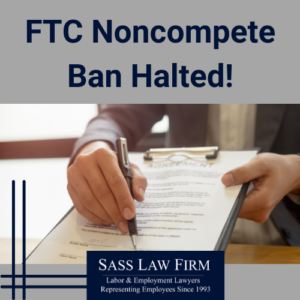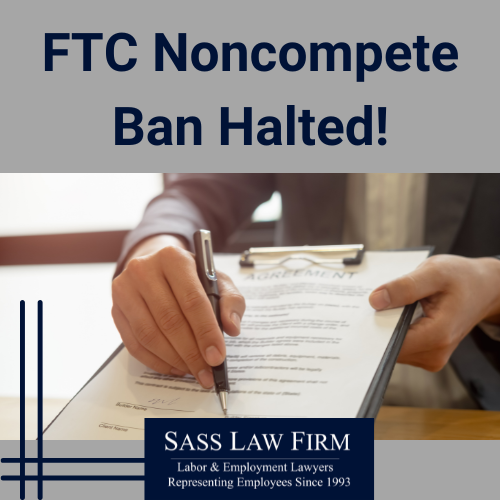 As many of our readers may recall from our previous blog post, the Federal Trade Commission (FTC) issued a final rule banning most noncompete agreements on a nationwide basis, which was set to take effect on September 4, 2024. However, recent legal developments have altered this trajectory, leaving many employees, particularly those in Florida, wondering about the implications for their current and future employment situations.
As many of our readers may recall from our previous blog post, the Federal Trade Commission (FTC) issued a final rule banning most noncompete agreements on a nationwide basis, which was set to take effect on September 4, 2024. However, recent legal developments have altered this trajectory, leaving many employees, particularly those in Florida, wondering about the implications for their current and future employment situations.
The Latest Development
On August 20, 2024, U.S. District Judge Ada Brown of the U.S. District Court for the Northern District of Texas made a significant ruling. Judge Brown determined that the FTC’s rule banning most noncompete agreements will not go into effect on September 4, 2024 or thereafter. This decision has effectively halted the implementation of the FTC’s proposed ban, at least for now.
What This Means for Florida Employees
Unfortunately for many Florida workers, this ruling means the status quo remains unchanged. Florida law continues to enforce noncompete agreements under certain conditions. Specifically:
- Continued Enforceability: Noncompete agreements in Florida are still enforceable if they protect a legitimate business interest. This means that existing noncompete agreements remain in effect, and employers can continue to require new employees to sign such agreements in certain circumstances.
- Legitimate Business Interests: Under Florida law, legitimate business interests that can justify a noncompete agreement include trade secrets, valuable confidential business information, substantial relationships with specific prospective or existing customers, patients, or clients, customer goodwill, and extraordinary or specialized training.
- Reasonableness Standard: Florida courts will continue to evaluate noncompete agreements based on their reasonableness in terms of time, area, and line of business. If a noncompete is too broad, the courts will blue pencil or narrow its scope, if appropriate.
- Burden on Employees: Employees who have signed or will be required to sign noncompete agreements must carefully consider the potential limitations on their future employment opportunities within their industry or geographical area, and if unsure about the enforceability of such agreement should consult with an experienced noncompete attorney in this area.
Looking Ahead
While this ruling is a setback for those hoping for a nationwide ban on noncompete agreements, it’s important to note that this is likely not the end of the story. Depending on other pending cases deciding the same issues, there may be appeals forthcoming and even potential consideration by the Supreme Court on this issue.
For now, Florida employees should:
- Stay Informed: Keep abreast of any changes in both federal and Florida state laws regarding noncompete agreements. This knowledge can be crucial when negotiating employment terms or considering career moves.
- Negotiate Carefully: When presented with a noncompete agreement, try to negotiate its terms. This might include limiting the agreement’s duration, geographical scope, or the specific prohibited activities.
- Document Your Skills and Knowledge: Keep detailed records of the skills and knowledge you possess before joining a company. This can help differentiate between your pre-existing expertise and any confidential information or training provided by the employer.
- Seek Legal Counsel: Before signing a noncompete agreement or if you’re considering leaving a job where you’ve signed one, consult with an employment attorney. They can provide personalized advice based on your specific situation and the current legal landscape.
- Consider Alternative Employment Protections: If you’re in a position to negotiate, consider proposing alternative arrangements that protect the employer’s interests without unduly restricting your future opportunities. This might include non-disclosure agreements or agreements to not solicit clients or employees.
- Professional Development: Continue to develop a broad skill set that isn’t tied to any one employer. This can increase your value in the job market and potentially mitigate the impact of a noncompete agreement.
- Carefully review any noncompete agreements before signing.
- Seek legal counsel if unsure about the terms or enforceability of a noncompete agreement.
- Stay informed about any future developments in this area of law, both at the federal and state level.
We will continue to monitor this situation closely and provide updates as new information becomes available. As always, for specific legal advice regarding your situation or noncompete agreement, please consult an experienced noncompete attorney. Sass Law Firm represents clients in the review, negotiation and litigation regarding noncompete agreements and is here to serve Tampa Bay’s workers.

